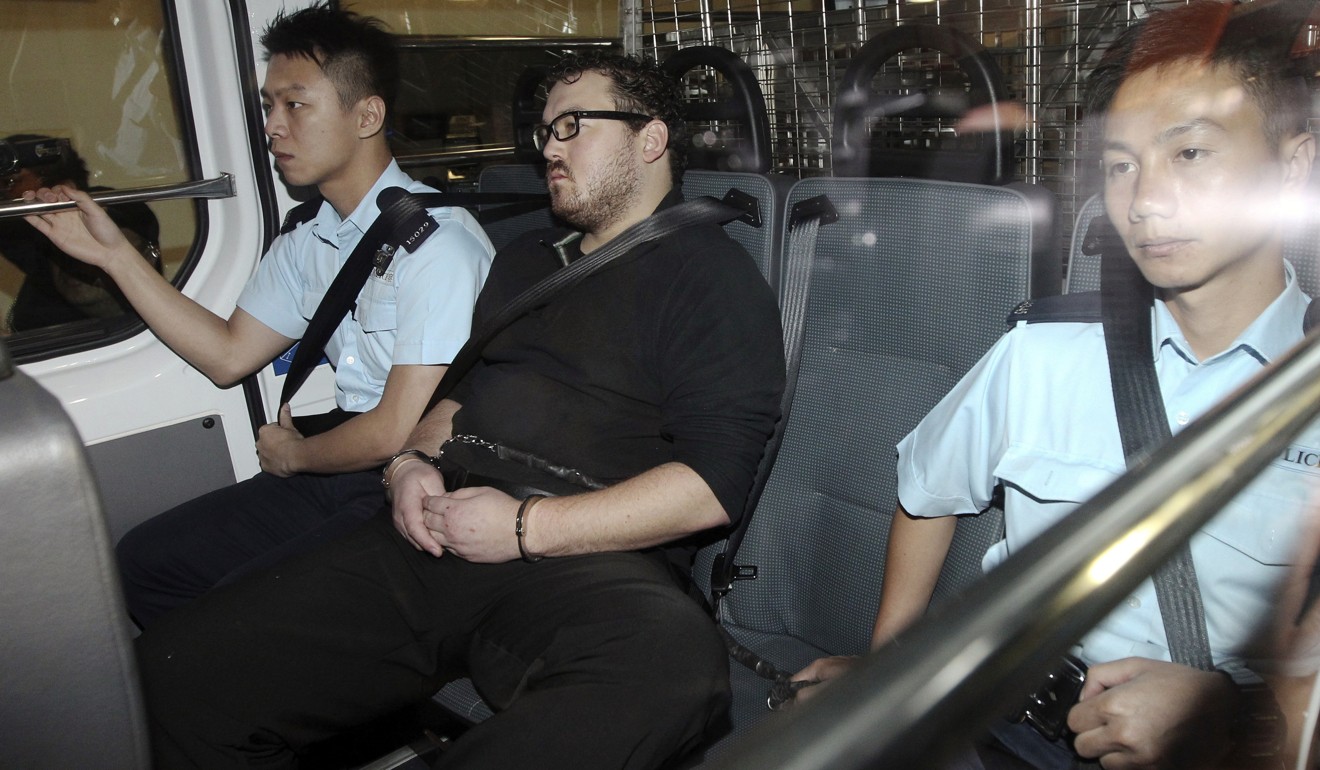
Rurik Jutting’s defence team slams judge for misleading jury as banker begins appeal against double murder conviction
Briton makes first public appearance since he was jailed for life for gruesome killings of two Indonesian women in Hong Kong
Rurik Jutting, the British banker jailed for life for the gruesome killings of two Indonesian women in Hong Kong, was back in court on Tuesday to appeal his murder conviction, with his lawyers attacking the conduct of the judge at his original trial.
If the appeal is successful, his convictions will be quashed opening up doors for different scenarios including a retrial.
Gerard McCoy SC, Jutting’s new barrister, told the court that two crucial actions by presiding judge Michael Stuart-Moore had misled the jury, causing them to convict his client of murder.
The first had to do with the state of Jutting’s mind at the time of the killings. Jutting admitted to killing the two women but his lawyers at the first trial last year argued that he was not guilty of murder because of an “abnormality of the mind” that impeded his judgment, claiming “diminished responsibility”.
By law, diminished responsibility is an impaired mental state which is considered to make a person less answerable for murder and can be grounds to reduce the charge to manslaughter.
Whether this impaired mental state could only stem from a disorder is at the heart of the defence’s argument.

Stuart-Moore damaged the defence’s case, McCoy said, when he told the jury to consider whether the banker had a narcissistic personality disorder and a sexual sadism disorder.
McCoy said that hurt his client because while a disorder can cause an abnormal mind, a person’s mental state could be abnormal without a disorder.
“The case turned to the word ‘disorder’,” he said, arguing that Stuart-Moore had put unnecessary emphasis on whether a full-blown disorder was the root cause of Jutting’s mental state at the time of the killings.
This damaged his client’s case, he said, because while not all experts who testified said Jutting suffered from a disorder, they all said the Cambridge graduate showed traits of the disorders that fell far outside the normal range of an ordinary person.
As a result of the judge’s direction, McCoy said, the jurors were invited to consider whether Jutting had disorders rather than decide if those traits constituted an abnormality of the mind – the thrust of his case which, if successful, would have allowed the jury to return a guilty verdict for manslaughter instead of murder.
“This is an extremely serious error,” the lawyer said.

The second issue concerned what McCoy called the judge’s unfair criticism of the defence’s two leading expert witnesses, psychologist Derek Perkins and forensic psychiatrist Dr Richard Latham.
Stuart-Moore, during his summation, had said Perkins and Latham failed to answer the “ultimate issue” as to whether an “abnormality of mind” had substantially affected a defendant. But, McCoy said, by law expert witnesses could not give their opinion on the effect – that was for the jury to decide.
The professionalism of the experts, McCoy said, “proved to be the downfall”.
Another barrister for Jutting, Tim Parker, said there was also an issue with the way Stuart-Moore advised the jury to treat both counts as essentially the same.
Towards the end of the trial, Stuart-Moore said that the verdicts should be consistent because the killings were made only days apart and that if they returned a murder verdict for one count they should do the same for the other – and not return one murder verdict and one manslaughter verdict.
“The direction makes the jury give less than full considerations in either one of the two counts,” Parker said.

Wearing a light blue shirt, the bespectacled Jutting, 32, leaned forward and rested his arms on a desk in the dock as he watched the proceedings, fiddling with the court documents he had brought with him from time to time.
This was his first public appearance since he was jailed for life in November 2016.
When he stood trial a year ago, the once 91kg (200-pound) expatriate, who had indulged in a lifestyle of drug and alcohol abuse while in Hong Kong, stunned many when he turned up in the dock appearing to be as fit as – if not fitter than – the corrections officers who escorted him.
His tremendous weight loss appeared to have begun when he was remanded into custody as a suspect after the murders in 2014.
The slimmer version of Jutting, his erstwhile curly locks shaved bald, prompted the local press at the time to compare him with American actor Wentworth Miller, who played Michael Scofield in the popular drama Prison Break.
Double murderer Rurik Jutting set for Hong Kong appeal court after 13 months in prison as family visits
Jutting was jailed for life by Stuart-Moore on November 8 last year, the same day he was convicted.
A nine-member jury unanimously found the former banker guilty of murdering Sumarti Ningsih, 23, and Seneng Mujiasih, 26, at his Wan Chai flat between late October and early November 2014.
The murders began with Jutting offering both women money to have sex.
Prosecutors told the court that Jutting, fuelled by cocaine and alcohol, tortured Sumarti for three days with “increasingly cruel acts of violence using his belt, sex toys, a pair of pliers and his fists” until he eventually slit her throat, capturing the killing on film, around October 27.
Five days later, he took Seneng back to his flat and cut her throat too.
Rurik Jutting found guilty of brutal double murder in Hong Kong, sentenced to life in jail
The Post learned that the former Bank of America Merrill Lynch employee’s family members had visited him after he was given a life sentence.
His parents, Graham and Helen Jutting, were rarely seen in the spotlight of the press and had not appeared in the public gallery to support their son during the trial. Media reports said they had divorced since Jutting was jailed.
Tuesday’s trial was heard before appeal court vice-president Mr Justice Michael Lunn, Justice of Appeal Andrew Macrae and Court of First Instance judge Kevin Zervos.
John Reading SC, representing the justice department, began his rebuttal by saying the issue of whether Jutting’s traits had impaired his mental state should have been addressed, but it was not the main issue the jury had to consider.
The trial was expected to continue on Wednesday with Reading presenting more of his case.

